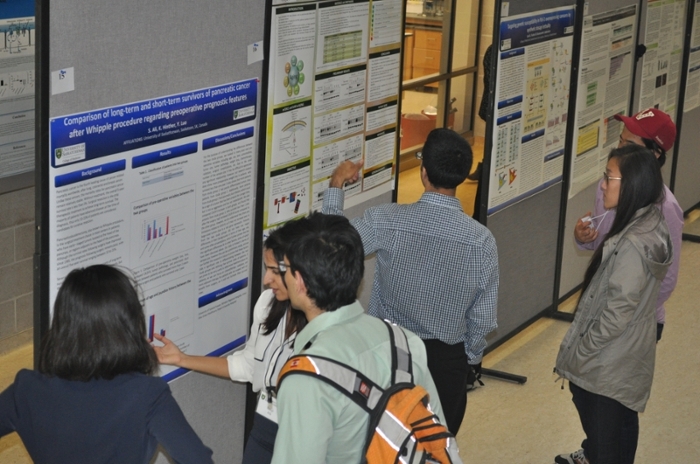
Summer research projects helping students, clinicians
The 65 funded Dean's Summer Research Projects are helping to bridge the gap between scientist and clinicians at the CoM
By Marg SheridanAnother summer, another round of Dean’s Summer Research Projects underway across the province.
With 60 projects funded over the next 10 weeks, the program introduces students to the intricacies of medical research – and based on the number of proposals that were submitted, it’s a program that they appreciate.
With students participating from both Regina and Saskatoon, the approved projects cover the spectrum from obstetrics to emergency medicine, and feature titles including ‘The METR:IQ Study: Evaluating the Quality of Medical Podcasts’ and ‘Representation of HIV in Popular Culture.’
The Office of the Vice Dean of Research believes the projects are a vital component of helping not only students get a head-start on learning the essentials of medical research, but also of helping early-career faculty succeed in their research - a strategy that is essential to the long-term success of the CoM’s research program. By engaging the students in research, and ultimately increasing the research being done by residents and clinicians, the program is fostering medical research that can improve health care strategies and save lives in Saskatchewan.
And that’s a belief mirrored by the clinicians and faculty who work with the students each summer.
“This year I have taken eight summer students, four of whom are medical students,” explained Dr. Franco Vizeacoumar, who is supervising three Dean’s Summer Research students. “Despite having already accepted the summer students, when the medical students approached me I still happily agreed to work with them for one reason: currently there is a huge disconnect between basic scientists and clinicians.”
And Vizeacoumar, who is both a research scientist with the Saskatchewan Cancer Cluster and an adjunct professor in the Division of Oncology, is well placed to see both sides of that disconnect.
“This gap needs to be reduced, and best strategy is to inculcate the desire to ask provocative questions and develop the ability to address these issues by the new generation of clinicians,” Vizeacoumar continued. “In fact, for the success of the scientific enterprise of Canada, it is important that there are more clinician scientists and these summer trainings I believe will provide newer options for med students to seriously consider these career paths.”
The projects also give departments some much needed help in increasing the amount of research they can do during the summer months.
“(We’ve) taken on 14 students this summer because we see the program as an opportunity to extend our capacity for research, while at the same time fostering the development of our future colleagues,” explained Dr. Brent Thoma, who is both a clinical associate professor and the research director with the Department of Emergency Medicine. “Far from being a burden, I have found the medical students to be intelligent and motivated members of my research team who bring extensive experience to the table from their prior studies or careers.”
And, he stressed, the projects help the students to foster both important mentorship relationships and gives them the opportunity to explore the medical specialty that they may already be interested in pursuing.
A total of 68 per cent of the 65 funded projects are being researched by first-year students, with the remaining 32 per cent by second-year students. And the research office is looking forward to increasing the number of research projects to 80 in 2017 as the overall funding increases – funding that this year amounted to a total of $323,000 going towards the projects, with two-thirds of that coming from the office of the vice dean of research, and the remaining third from endowments or trusts donated to the college.
